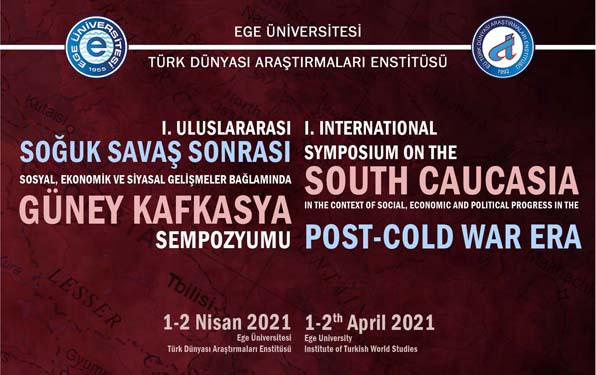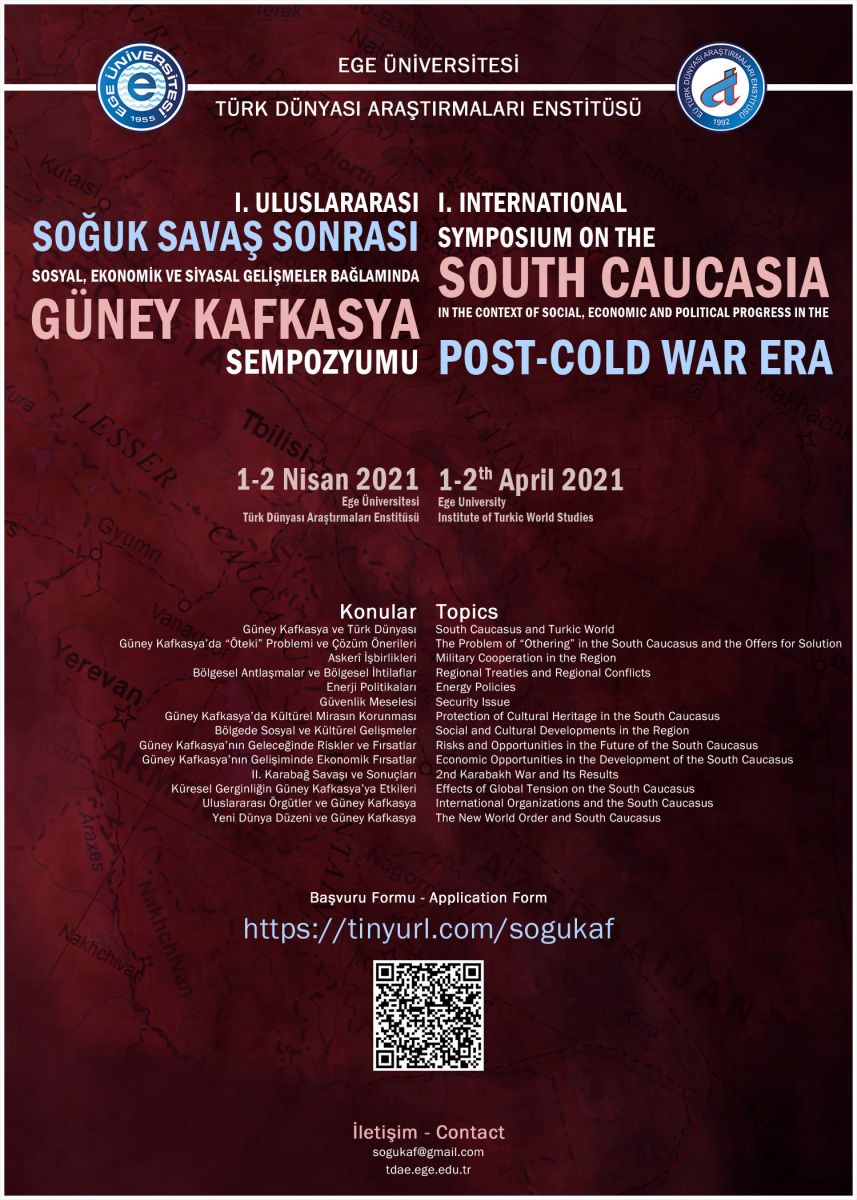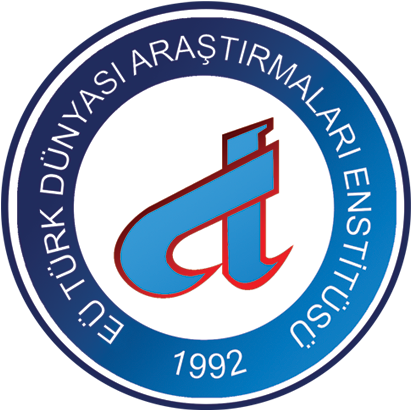
I. ULUSLARARASI
SOĞUK SAVAŞ SONRASI SOSYAL, EKONOMİK VE SİYASAL GELİŞMELER BAĞLAMINDA
GÜNEY KAFKASYA SEMPOZYUMU
Sayın bilim insanı,
Güney Kafkasya ya da diğer adıyla Transkafkasya, günümüzde Azerbaycan, Gürcistan ve Ermenistan devletlerinin topraklarını içine alan bölgeyi tanımlamak için kullanılmaktadır. Tarihin her döneminde farklı medeniyetlerin hâkimiyet mücadelelerine tanıklık etmiş olan bu bölge, Doğu Avrupa, Batı Asya ve Ortadoğu arasında yer alan kadim bir medeniyet köprüsüdür. İpek Yolu’nu kullanan tüccarlar, Doğu-Batı arasında seyahat eden ilim insanları, kuzeyden güneye hareket eden paralı askerler ve mensubu oldukları inancı yaymak isteyen din adamları bu topraklardan geçmiş ve bölgenin kültürel, ekonomik ve sosyal gelişimine büyük katkı sağlamışlardır.
Güney Kafkasya’daki tarihî kırılma ise 19. yüzyılın ilk çeyreğinde gerçekleşmiştir. Bu dönemde, bölgedeki nüfuzunu arttırma politikası güden Rus Çarlığı, bir taraftan Kaçar Hanedanı, diğer taraftan Osmanlı Devleti ile mücadele etmiş; Britanya İmparatorluğu gibi devletler de sahip oldukları farklı unsurlar vasıtasıyla bölgenin politikasında rol oynama çabasına girmiştir. Mücadelenin sonunda galip gelen Rus Çarlığı 1918 yılında yıkılana dek bölgedeki hâkimiyetini korumuştur. Ancak Bolşevik Devrimi sonrasında bölge yeniden şekillenmiş, burada Türk dünyasının ilk demokratik cumhuriyeti olan Azerbaycan Demokratik Cumhuriyeti ile birlikte Ermenistan Demokratik Cumhuriyeti ve Gürcistan Demokratik Cumhuriyeti kurulmuştur. Güney Kafkasya’daki bu süreç, 1920’li yıllarda bölgede yeniden hamleler yapan Sovyet Sosyalist Cumhuriyetler Birliği’nin (SSCB) faaliyetleri ile yeni bir safhaya geçmiş, SSCB’nin bünyesinde Azerbaycan Sovyet Sosyalist Cumhuriyeti, Ermenistan Sovyet Sosyalist Cumhuriyeti ve Gürcistan Sovyet Sosyalist Cumhuriyeti kurulmuştur. Stratejik konumu ile birlikte zengin yeraltı ve yerüstü kaynaklarına sahip olan Güney Kafkasya, yıllar içinde SSCB’nin çıkarları açısından daha büyük önem arz eder hâle gelmiştir. Bu sebeple Azerbaycan Türkleri ile ortak tarihî ve kültürel bağları olan Türkiye Cumhuriyeti başta olmak üzere, bölgede nüfuzunu arttırmak isteyen diğer küresel güçler SSCB’nin engellerine takılmış; Soğuk Savaş süreci boyunca bölgede kimi zaman açık, kimi zaman ise kapalı olarak büyük mücadeleler yaşanmıştır.
SSCB’nin dağılması neticesinde 9 Nisan 1991’de Gürcistan, 23 Eylül 1991’de Ermenistan, 18 Ekim 1991’de Azerbaycan’ın bağımsızlığını ilan etmiş, Güney Kafkasya’daki paradigma bütünüyle değişmiştir. Azerbaycan ile tarihî ve kültürel bağları olan Türkiye başta olmak üzere pek çok siyasî güç bölgedeki devletlerle sosyal, ekonomik ve kültürel ilişkilerini arttırma yoluna gitmiştir. Bu süreçte Karabağ’ın Ermenistan tarafından işgal edilmesi sonucunda ortaya çıkan Azerbaycan-Ermenistan gerginliği, Gürcistan’ın iç karışıklıkları ile ilişkili olarak şekillenmiş Gürcistan-Rusya mücadelesi bölgedeki gerginliği arttırmıştır. Türkiye, Azerbaycan ve Gürcistan’ın ortak şekilde yürüttüğü Bakü-Tiflis-Ceyhan boru hattı, Bakü-Tiflis-Kars demiryolu gibi girişimler bölgedeki potansiyelin artışı için yeni imkânların ortaya çıkmasını sağlamıştır. 27 Eylül 2020 ile 10 Kasım 2020 tarihleri arasında cereyan eden II. Karabağ Savaşı sonucunda Azerbaycan askerî ve diplomatik zafer kazanması ise bölgedeki dengeleri değiştirmiş, bölgedeki devletler için yeni fırsat ve tehlikeler yaratmıştır.
Yukarıda belirtilen tarihî ve güncel hususlara binaen Ege Üniversitesi, Türk Dünyası Araştırmaları Enstitüsü, Güney Kafkasya’da yaşanan son gelişmelere dikkat çekmek ve konuları bilimsel bir platformda ele almak amacıyla 1-2 Nisan 2020 tarihleri arasında çevrimiçi (online) olarak “I. Uluslararası Soğuk Savaş Sonrası Sosyal, Ekonomik ve Siyasal Gelişmeler Bağlamında Güney Kafkasya Sempozyumu”nun düzenlenmesi kararını almıştır. Sempozyum bünyesinde ele alınacak ana başlıklar şöyle sıralanabilir:
- Güney Kafkasya ve Türk Dünyası,
- Güney Kafkasya’da “Öteki” Problemi ve Çözüm Önerileri,
- Askerî İşbirlikleri,
- Bölgesel Antlaşmalar ve Bölgesel İhtilaflar,
- Enerji Politikaları,
- Güvenlik Meselesi,
- Güney Kafkasya’da Kültürel Mirasın Korunması,
- Bölgede Sosyal ve Kültürel Gelişmeler,
- Güney Kafkasya’nın Geleceğinde Riskler ve Fırsatlar,
- Güney Kafkasya’nın Gelişiminde Ekonomik Fırsatlar,
- II. Karabağ Savaşı ve Sonuçları,
- Küresel Gerginliğin Güney Kafkasya’ya Etkileri,
- Uluslararası Örgütler ve Güney Kafkasya,
- Yeni Dünya Düzeni ve Güney Kafkasya.
Sempozyuma katılım göstermeniz bizlere güç ve onur verecektir. Davetimizi kabul etmeniz hâlinde bildirinizin tam metnini, aşağıdaki başvuru formu üzerinden tarafımıza göndermeniz gerekmektedir. Bildirilerin son gönderim tarihi 5 Mart 2021 olarak belirlenmiştir. Sizden bildirinizi hazırlarken “Bildiri Yazım Kılavuzumuza” uygun şekilde hazırlamanızı rica ediyoruz. “Bildiri Yazım Kılavuzuna” uygun hazırlanmayan bildiriler kabul edilemeyecektir. Gönderilen bildiriler “Sempozyum Hakem Kurulu” tarafından değerlendirilecek, kabul edilen bildiriler e-posta yoluyla bilgilendirecektir. Sempozyum sonrasında seçilen bildirilerin uluslararası bir yayınevi tarafından yayımlanacak kitap bünyesinde değerlendirilmesi planlanmaktadır.
Saygılarımızla,
Sempozyum Düzenleme Kurulu Adına
Prof. Dr. Nadim MACİT
Ege Üniversitesi
Türk Dünyası Araştırmaları Enstitüsü Müdürü
BAŞVURU FORMU (GOOGLE HESABI İLE)
BAŞVURU FORMU (DİĞER HESAPLAR İLE)
Not: Diğer hesaplar ile başvuru yapan katılımcıların bildirilerini bir bulut sistemine yüklemesi ve paylaşım bağlantısını "Tam Bildiri Metni Linki" bölümüne kopyalaması gerekmektedir.
---------------------------------------------------------------------------
I. INTERNATIONAL SYMPOSIUM ON
THE SOUTH CAUCASIA IN THE CONTEXT OF
SOCIAL, ECONOMIC AND POLITICAL PROGRESS IN
THE POST-COLD WAR ERA
Dear colleagues,
The South Caucasus, also known as Transcaucasia, is nowadays used to describe the region that includes the territories of Azerbaijan, Georgia and Armenia. This region, which has witnessed the various civilizations’ struggles for domination in every period of history and considered as an ancient bridge connecting civilizations, located between Eastern Europe, West Asia and the Middle East. Merchants using the Silk Road, scientists traveling between East and West, mercenaries moving from north to south, and clergymen who wanted to spread their beliefs had passed through these lands and contributed substantially to the cultural, economic and social development of the region.
The historical breaking point in the South Caucasus had occurred in the first quarter of the 19th century. During this period, the Tsardom of Russia, which pursued a policy of increasing its influence over the region, struggled with the Qajar Dynasty on the one hand and the Ottoman Empire on the other; states, like the British Empire, have tried to play a role in the politics of the region through their different elements. The Tsardom of Russia, which was victorious at the end of the struggle, maintained its dominance over the region until it collapsed in 1918. However, after the Bolshevik Revolution, the region was reshaped and the Democratic Republic of Armenia and the Democratic Republic of Georgia were established there, together with the Azerbaijan Democratic Republic, the first democratic republic of the Turkic world. This process in the South Caucasus has paved the way for a new phase with the activities of the Union of Soviet Socialist Republics (USSR), which was active in the region in the 1920s, and in the next breath the Azerbaijan Soviet Socialist Republic, the Armenian Soviet Socialist Republic and the Georgian Soviet Socialist Republic were established within the structure of the USSR. South Caucasus, which has possessed rich natural resources in addition to its charming strategic location, has become more important for the interests of the USSR over the years. Therefore, especially the Republic of Turkey, which has common historical and cultural ties with the Turks in Azerbaijan, and other global powers seeking to increase their influence over the region have met to the USSR barriers; thus, great struggles, some of which were open and others were closed to public, were experienced in the region during the Cold War.
Because of the dissolution of the USSR, Georgia declared the independence of Georgia on 9th April 1991; Armenia on 23th September 1991; and Azerbaijan on 18th October 1991. So, the paradigm in the South Caucasus has changed completely. Turkey which has historical and cultural ties with Azerbaijan, has sought to increase economic and cultural relations. In this process, the Azerbaijan-Armenia tension that emerged because of the occupation of Karabakh by Armenia, and the Georgia-Russia struggle, which was shaped in relation to the internal conflicts of Georgia, have caused to increase the tension in the region. Turkey, Azerbaijan and Georgia found a common way to execute the Baku-Tbilisi-Ceyhan Pipeline, Baku-Tbilisi-Kars Railway to increase the potential of the region. In the year of 2020, Azerbaijan won a military and diplomatic success in the 2nd Karabakh War between 27th September 2020 and 10th November 2020. This victory changed the balance in the region and created new opportunities and threats.
Because of the historical and contemporary reasons as we have noted above, Ege University Institute of Turkic World Studies has aimed to evaluate the latest changes in the South Caucasus and has decided to organize an international online symposium on the “South Caucasia in the Context of Social, Economic and Political Progresses after the Cold War” between 1-2th April 2021. The main subjects, which will be handled on the symposium can be listed as:
- South Caucasus and Turkic World,
- The Problem of “Othering” in the South Caucasus and the Offers for Solution,
- Military Cooperation in the Region,
- Regional Treaties and Regional Conflicts,
- Energy Policies,
- Security Issue,
- Protection of Cultural Heritage in the South Caucasus,
- Social and Cultural Developments in the region,
- Risks and Opportunities in the Future of the South Caucasus,
- Economic Opportunities in the Development of the South Caucasus,
- 2nd Karabakh War and Its Results,
- Effects of Global Tension on the South Caucasus,
- International Organizations and the South Caucasus,
- The New World Order and South Caucasus.
We will appreciate and be very honored by your attendance. If you wish to participate in the symposium, you are supposed to send us “Full Text of your Paper” via the personal information form, which you can find its URL attached. The deadline for sending your papers is 5th March 2021. We kindly asked you to follow our writing guidelines. If your proceeding does not comply with the writing guidelines, it would not be accepted. Submitted papers will be evaluated by the “The Referees Committee”, and the accepted ones will be informed via e-mail. After the symposium, selected papers are planned to be published as chapters in the book by an international publishing house.
Sincerely,
On Behalf of the Symposium Organizing Committee
Prof. Dr. Nadim MACİT
Ege University
Director of Institute of Turkic World Studies
APPLICATION FORM (WITH GOOGLE ACCOUNT)
APPLICATION FORM (WITH OTHER ACCOUNTS)
Note: The applicants who will apply with other accounts should add the URL of their "Full Text of Paper" which is uploaded to a cloud server.











